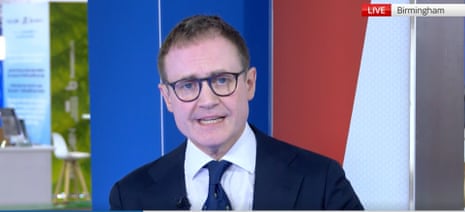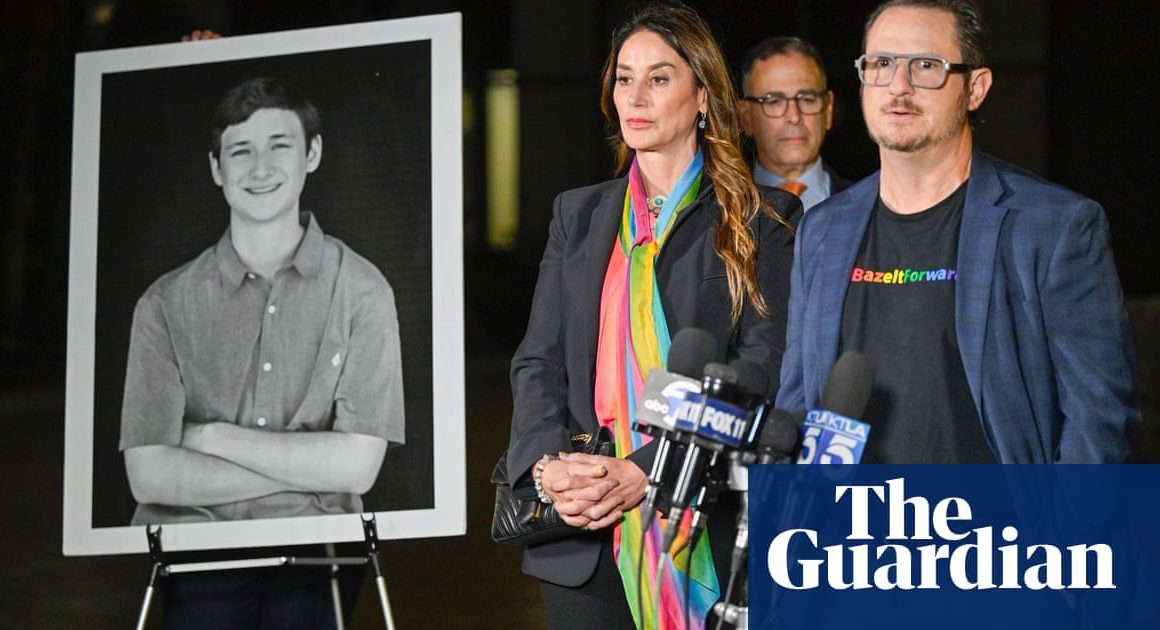Tory leadership rivals turn on Jenrick over claims SAS ‘killing, not capturing, terrorists’
Good morning. In a leadership contest, sometimes the dynamic changes because one candidate has a postive breakthrough moment (like David Cameron did in 2005, when his passionate, no-notes speech to the Tory conference turned him almost overnight into the favourite). But more often the odds shift because someone has messed up. Kemi Badenoch’s campaign faltered this week after her maternity pay gaffe. And now Robert Jenrick, the bookmakers’ favourite, has also made an error serious enough to cost him support.
Yesterday he released a video claiming that that UK special forces are “killing rather than capturing” terrorists because of fears that European laws would free any detained assailants. As Rajeev Syal, Jessica Elgot and Dan Sabbagh report, he has been condemned for saying this by Labour and by figures in the military.
Now fellow leadership candidates are also piling in, saying that he is wrong and suggesting that his comments are maligning special forces.
In an interview on Sky News this morning, Tom Tugendhat, a former soldier, was asked if he agreed with Jenrick that the SAS were killing rather than capturing people because of human rights laws. Tugendhat replied:
No, I don’t. I think what he said is wrong, and I’m afraid demonstrates a fundamental misunderstanding of military operations and the law of armed conflict.
I’m extremely concerned that such words should not be seen in any way to encourage people to take any action other than surrender to British forces when asked to do so.
I think he’s wrong, and demonstrates a fundamental lack of understanding.
And James Cleverly, the former foreign secretary who has also served in the military, also refused to back Jenrick’s claim. Asked on Sky News if Jenrick was right to say the SAS were acting in this way, Cleverly replied:
You’re going to have to ask Robert to justify that statement.
That’s not something which I have heard, that’s not something which I’m comfortable repeating.
As I say, if Robert is able to justify that, I think he should.
The British military always abide by international humanitarian law, the law of armed conflict. We have the the most professional military in the world are military. Our military do not murder people.
Jenrick was on the Today programme this morning where he had a difficult time defending what he said. He would not accept that he was wrong, or that he should have chosen his words more carefully, but when asked repeatedly if he was sure the armed forces were “killing rather than capturing” terrorists now because of human rights law, he just repeatedly referred to a Telegraph interview that Ben Wallace, the former defence secretary, gave last year where he said:
When we have a threat to the UK, this lunacy of being unable to render people across borders or arrest people in countries whose police forces are unacceptable, means that we are more often than not forced into taking lethal action than actually raiding and detaining.
I will post more from the Jenrick interview soon.
Here is the agenda for the day.
10am: The Tory conference opens, with sessions on the main stage covering policing, the future generation and policy.
2pm: Robert Jenrick takes part in a Q&A on the main stage at conference.
2pm: Tom Tugendhat takes part in an conversation event at a fringe organised by Onward. At 3.10pm he will doing the same at a Centre for Policy Studies fringe.
3pm: James Cleverly does his Q&A on the main stage.
5pm: Kemi Badenoch takes part in an in conversation event at a fringe meeting with the outgoing Spectator editor, Fraser Nelson.
If you want to contact me, please post a message below the line (BTL) or message me on social media. I can’t read all the messages BTL, but if you put “Andrew” in a message aimed at me, I am more likely to see it because I search for posts containing that word.
If you want to flag something up urgently, it is best to use social media. I’m still using X and I’ll see something addressed to @AndrewSparrow very quickly. I’m also trying Bluesky (@andrewsparrowgdn) and Threads (@andrewsparrowtheguardian).
I find it very helpful when readers point out mistakes, even minor typos (no error is too small to correct). And I find your questions very interesting too. I can’t promise to reply to them all, but I will try to reply to as many as I can, either BTL or sometimes in the blog.

Key events
-
Ex-defence secretary Grant Shapps says he has seen ‘no evidence’ to back up Jenrick’s claim about SAS killing terrorists
-
Green party more of threat to Conservatives at local elections than Reform UK, Tory councillors’ leader suggests
-
Almost third of Tory voters think it would be good if Reform UK replaced Conservatives as main rightwing party, poll suggests
-
Voters overall narrowly prefer last Tory government to current Labour one, poll suggests
-
More than half Tory members favour merger with Reform UK, according to survey from rightwing PopCon group
-
Tugendhat most popular candidate, Badenoch least popular, with public at large, poll suggests
-
Badenoch declares war on ‘bureaucratic class’ and ‘safetyism’ in essay setting our her political philosophy
-
Jenrick has almost caught up with Badenoch in popularity with Tory members, poll suggests
-
Jenrick defends claim about SAS killing not capturing terrorists due to ECHR, saying his point ‘absolutely correct’
-
Tory leadership rivals turn on Jenrick over claims SAS ‘killing, not capturing, terrorists’
Ex-defence secretary Grant Shapps says he has seen ‘no evidence’ to back up Jenrick’s claim about SAS killing terrorists
Grant Shapps, the former defence secretary, has said that he has seen “no evidence at all” to back up Robert Jenrick’s claim that special forces have been “killing rather than capturing” terrorists because human rights laws would prevent them being detained. He made the comment in an interview with Matt Chorley from Radio 5 Live.
“It’s not true in the terms of special forces. I have seen no evidence of that at all.”
Former defence secretary Grant Shapps rejects Jenrick’s claim that that British special forces are “killing rather than capturing terrorists”.
More on @bbc5live from 2pm pic.twitter.com/rsPNtJZ7du
— Matt Chorley (@MattChorley) October 1, 2024
“It’s not true in the terms of special forces. I have seen no evidence of that at all.”
Former defence secretary Grant Shapps rejects Jenrick’s claim that that British special forces are “killing rather than capturing terrorists”.
Shapps was defence secretary for about a year before the general election, having held several other cabinet posts in the past.
Bookmakers have cut their odds on James Cleverly to win the Tory leadership, in a sign that events at Tory conference over the past 48 hours may have helped his chances more than anyone else’s.
Robert Jenrick remains the favourite. But, according to Oddschecker, a betting website, Cleverly’s odds were cut from 10/1 to 5/1 this morning after he attracted a surge of bets at short notice.
Leon Blackman from Oddschecker said:
The Conservative party leadership race has been a two-horse contest between Robert Jenrick and Kemi Badenoch, with both swapping positions as favorites since Rishi Sunak’s departure.
However, James Cleverly has emerged as a serious contender today, with his odds shortening from 10/1 to 5/1 and his bet share rising from 23% to 39%. Meanwhile, Badenoch’s bet share has sharply declined from 33% to 7% and her odds drifting by the minute.
Oddchecker has Jenrick favourite at 4/6, followed by Badenoch at 3/1, Cleverly at 5/1 and Tom Tugendhat at 16/1. That means Jenrick has a 56% implied probability of winning, Badenoch 23%, Cleverly 16% and Tugendhat 6%.
Ladbrokes has reported the same trend. Its spokesperson Alex Apati said:
James Cleverly has emerged as a genuine contender to replace Rishi Sunak over the last 24 hours or so. We wouldn’t be surprised to see him leapfrog Badenoch in the betting by the end of the week.
In a speech in the conference hall this morning a councillor complained about the national service policy announced in a surprise move at the start of the election campaign. Olly Scargill, a councillor from North Tyneside, said this was a wedge issue that alienated younger voters. He said:
I think in the general election some of what we campaigned upon was a wedge issue, wedge issues between young people and older people.
Things like national service was probably designed to play off younger people and older people, and when you’ve got a rising age of Conservative voter it is incredibly unsustainable.
What we need to do I think is we need to find a way to move the party to become more pro-housebuilding. And delivering more credible options for young people who want to be economically secure, and who are aspirational, that is a Conservative, those people should be voting Conservative, but they’re not.
Green party more of threat to Conservatives at local elections than Reform UK, Tory councillors’ leader suggests
Green party candidates could be more of a threat to the Tories in next year’s council elections than Reform UK, a senior councillor has said.
Phil Broadhead, who chairs the Conservative Councillors’ Association, told a fringe meeting that Nigel Farage’s party were a challenge, but that Green candidates had also won in “posh Tory areas”.
He said:
We have a lot of issues that are kind of cross-party nowadays, you know, environmental issues, for instance. I know that there are some people that are on the kind of opposite side of it.
But I can tell you, being out there in communities, travelling around the country as we did for the general election, this is a huge issue and actually politically we’re talking a lot about the threats – who knows what the threats might be when they manifest themselves in May – of Reform etc.
I’m more worried about the Greens actually.
In my campaigning at this election, I was going to places as far apart as Bristol and Bury St Edmunds where we have Greens running the council now.
And these are areas that – it’s not because they’re socialists, these are kind of posh Tory areas but people care about these particularly environmental protection issues.
So I think we need to occupy that space and regain it.
At the same meeting the Essex County Council leader Kevin Bentley said that his party had lost a lot of councillors because of infighting at Westminster and that he did not want to hear any more talk of the “five families” – a term used by rebels to refer to the five Tory factions at Wesminster that were coordinating opposition to Rishi Sunak on the Rwanda bill.
Bentley said:
Whoever the winner is, we all get behind them. None of this five families and all that nonsense. I don’t wanna hear it.
All I want to hear about is getting Conservatives into power at the town hall, county hall, parliament or wherever we possibly can, so we all rally around that new leader and no backbiting, no arguments.
Almost third of Tory voters think it would be good if Reform UK replaced Conservatives as main rightwing party, poll suggests
The More in Common poll also suggests that almost a third of Tory voters think it would be good for Britain if Reform UK were to replace the Conservatives as the main rightwing party.
Reform voters would unsurprisingly like their Party to replace the Tories as the largest right wing party. Perhaps more worryingly Tory voters only think that outcome would be a bad one by a 41-31 margin. pic.twitter.com/Dceg1A0vQ9
— Luke Tryl (@LukeTryl) October 1, 2024
This ought to be encouraging for those Tories who are actively encouraging some sort of pact with Nigel Farage’s party. (See 11.30am.)
But Luke Tryl, the UK director for More in Common, points out that his research also shows that, on some issues, Conservative voters and Reform UK voters have very different views.
But Reform and Conservative voters are not the same thing, on a range of issues Reform voters take a very different stance to Conservative voters, which means you cannot simply add the two groups together. pic.twitter.com/Ttnt2FcB5K
— Luke Tryl (@LukeTryl) October 1, 2024
Voters overall narrowly prefer last Tory government to current Labour one, poll suggests
Voters overall narrowly prefer the last Conservative govenment led by Rishi Sunak to the current one led by Keir Starmer, according to polling by the campaign group More in Common being unveiled at a conference fringe meeting today.
🆕 In a sign of how volatile the electorate are voters are actually slightly more likely to say they preferred the previous Government led by Rishi Sunak than the current Government led by Keir Starmer. Although even more say they don’t know which they prefer. pic.twitter.com/0sT7THAToS
— Luke Tryl (@LukeTryl) October 1, 2024
In a sign of how volatile the electorate are voters are actually slightly more likely to say they preferred the previous Government led by Rishi Sunak than the current Government led by Keir Starmer. Although even more say they don’t know which they prefer.
Luke Tryl, More in Common’s UK director, says this is because, even though Reform UK voters did not vote for Sunak at the election, they overwhelmingly think his government was better than Starmer’s.
Labour & Conservative voters are more likely to say they prefer the respective Governments of their parties. But Reform voters are more likely to say they preferred the last Conservative Government, Lib Dem voters are more split but lean towards preferring the current Government pic.twitter.com/DbWYd4ebgh
— Luke Tryl (@LukeTryl) October 1, 2024
Labour & Conservative voters are more likely to say they prefer the respective Governments of their parties. But Reform voters are more likely to say they preferred the last Conservative Government, Lib Dem voters are more split but lean towards preferring the current Government
Tryl also points out this does not mean Reform UK voters are all desperate to vote Tory again.
But Reform voters preference for the last Government doesn’t mean they’re about to return to the fold Con-Ref switchers are the least likely to say they’ll vote Tory again in this Parliament, only 1 in 10 say they will, compared to 1 in 4 Lib Dem switchers & 1 in 5 Lab switchers pic.twitter.com/4EIhF7foRn
— Luke Tryl (@LukeTryl) October 1, 2024
But Reform voters preference for the last Government doesn’t mean they’re about to return to the fold Con-Ref switchers are the least likely to say they’ll vote Tory again in this Parliament, only 1 in 10 say they will, compared to 1 in 4 Lib Dem switchers & 1 in 5 Lab switchers
More than half Tory members favour merger with Reform UK, according to survey from rightwing PopCon group
Popular Conservatism, or PopCon, has released the results of a survey of party members suggesting more than half of them favour a merger with Reform UK. Some 30% of the respondents said they tended to support the idea, and 23% were strongly in favour. The survey covered 470 members.
Annunziata Rees-Mogg, PopCon’s head of communications and a former Brexit party MEP, said:
Every Conservative activist and canvasser knows people who had been Tories, but voted Reform UK in July. It is no surprise our panellists understand that the next leader of the party needs to take action to bring many like-minded voters back to the Tories. Almost three-quarters want a relationship with Reform in order to unite the right.
Rees-Mogg’s brother Jacob has called for the Tories to form an electoral pact with Reform UK.
Popular Conservatism is a rightwing group run by Mark Littlewood, one of Liz Truss’s strongest supporters.
Talking about opinion polls, Jacob Rees-Mogg, the rightwing former business secretary, has told the Telegraph he is not in favour of them. He said:
The answer I was often given by people in government at the time was that lockdowns were very popular.
They were getting 60, 70, 80% popularity ratings in the opinion polls. But you mustn’t believe those opinion polls, they’re basically nonsense.
People want to give the worthy answer. You’ve got to recognise that government by focus group, government by opinion poll, doesn’t work. You need to govern by what you believe in …
That’s what Margaret Thatcher did and I think we were much too seduced by government by focus group, government by opinion poll.
Tugendhat most popular candidate, Badenoch least popular, with public at large, poll suggests
In party leadership contests sometimes members end up choosing the candidates who is also most popular with the public at large. This is what Labour did in 1994, the Tories in 2005 and Labour in 2020, and generally it turns out to be a sensible move if a party wants to win a general election.
But sometimes the person most popular with members is the person least popular with the the public at large. This happened with Labour in 2015, and with the Conservatives in 2022, and the Tories seem to be doing the same thing again. As the latest YouGov polling suggests, Kemi Badenoch is the members’ favourite, and Tom Tugendhat is their last choice. (See 9.37am.) A recent ConservativeHome survey said the same.
But polling released by Savanta last night suggests that Tugendhat is the most popular candidate with voters overall. Savanta says:
Tom Tugendhat is the most popular Conservative leadership candidate among the wider public (net favourability -4) and 2024 Conservative voters (+32), according to new research from Savanta …
Robert Jenrick (-7) is the second most popular candidate among the public, alongside James Cleverly (-8), the most well-known candidate among public with the lowest proportion of Don’t Know’s (21%). Kemi Badenoch (-11) is the least popular, in research taken before her controversial comments about maternity pay.
Kemi Badenoch has the lowest net favourability of all four Conservative leadership candidates among the public (-11) and 2024 Conservative voters (+23).
Tom Tugendhat is the most popular candidate among the public (-4) and Conservative voters (+32)
20-22 Sept
2,050 UK adults pic.twitter.com/HlisDyAwnL— Savanta UK (@Savanta_UK) October 1, 2024
An Ipsos poll yesterday also had Tugendhat as the candidate with the best net ratings amongst the public at large.
Choosing a leader unpopular with the public large isn’t always a disastrous move for a party; in 1975 the Conservatives would not have gone for Margaret Thatcher if YouGov had been around and polling figures had been the main consideration. But, more often than not, it is indicative of a party only loosely tethered to what the country as a whole is thinking. And that is a problem for the Conservative party at the moment, as Polly Toynbee argues in her column today.
Badenoch declares war on ‘bureaucratic class’ and ‘safetyism’ in essay setting our her political philosophy
Earlier I suggested that, even though Robert Jenrick is more hardline on the ECHR, Kemi Badenoch is the most rightwing candidate in the contest. There is some evidence to support this in a 36-page pamphlet her team released last night, called Conservatism in Crisis. Described as an essay based on a forthcoming book, Your New Rules: Rise of the Bureaucratic Class, it does not seem to be available online, although the foreword, by Badenoch, has been published on ConservativeHome. (Who wrote the rest of the pamphlet is not clear.)
In her foreword, Badenoch argues that the Tories cannot win power again just by being a Brexit party. She explains:
While the general election result this year was disastrous for us, we need to consider a wider problem.
Since 1992, the Conservative party has only won a majority when Brexit was on the ballot paper; in 2015, through a pledge to hold a referendum on the European Union and in 2019, to ‘Get Brexit Done’.
By 2029 we will have not won a majority without this issue in nearly four decades.
So, when people say we just need to deliver policy X or policy Y, and then everything will be fine again, they are kidding us and themselves. This is not just about politics. It is about a wider economic and cultural malaise that has set in across a complacent west that is living off the inheritance built by previous generations.
So, if the party needs a new cause, what should it be? The pamphlet proposes war on the “bureaucratic class”. In a passage explain who these people are, the pamphlet says:
The bureaucratic class derives much of their income, or more widely, their justification, from government, through state spending but also an ever-growing regulatory state. They are very different from the market class of entrepreneurs and general market focused workers.
There is a microeconomic link between the bureaucratic class and the government. The key question in assessing the bureaucratic class is: Does this job primarily relate to providing goods or services in the market or administering rules set by government?
Another way to see the difference is the market orientated class gives people what they want and will pay for, and the bureaucratic class gives people what the bureaucratic class thinks they should want and what government can force or require people to have.
The pamphlet argues that the emergence of the bureaucratic class is linked to the expansion of HR departments, the growth in regulation in the financial sector and the rise of what it calls “safetyism”.
On HR and regulation, it says:
On human resources, in 2001, the ONS recorded 119,000 or so people working as personnel managers. By 2023, this had risen to 221,000, an increase of 86%. This happened at a time when productivity rose at historically low levels of 0.8% a year …
The ratio of regulators to financial services workers had increased from 1:11,000 in 1980 to 1:300 in 2011 and now stands at roughly 1:75. In a single decade, the proportion of Citigroup’s workforce devoted to compliance and risk went from 4% to 15%.
And it describes “safetyism” as an issue in universities. It says:
Safetyism benefits progressive academics, allied student activists, and most of all, the growing army of administrators. In the USA, a staggering 64% of those who work for universities are now not academics or researchers.
The pamphlet concludes:
We are moving to a new politics. The Conservatives have to realise the bureaucratic class and the new progressive ideology are their opponents. The idea that as Labour fails, then simply because a voter has a comfortable middle-class job, they will return to us is false.
There will have to be a new type of politics. To take on the bureaucratic class means to ditch radical environmental politics, unpick identity politics, focus on a strong positive national identity, limit migration, streamline HR, compliance, sustainability, planning, to focus on bringing down the cost of the welfare state and much more.
Peter Walker has more on the report, including Badenoch’s triangle theory of modern politics, in his story here.
In his interview on the Today programme, when asked to explain why he had gone from being an MP who voted against Brexit to one who is now, not just a supporter of Brexit but an advocate of leaving the European convention on human rights, Robert Jenrick said his values had not changed, but that his policies views had adapted in response to what he had learned.
Jenrick said:
My values haven’t changed, but it’s certainly true that over time the things I have seen in the ministerial jobs that I have done have led me to conclusions that the British state isn’t working in the interests of the British people, and in particular my time at the Home Office where I saw that we were not able to secure our borders and to keep the public safe, which to my mind is the most basic duty of our country.
These are from my colleague Peter Walker, who is at a fringe meeting organised by Popular Conservatism (PopCon), the rightwing group set up by Liz Truss supporters. Peter is not impressed by their strategic acumen.
I’m at a Tory fringe event about how to see off Reform, and already we’re hearing that the solution is – yes, for them to be more right wing on issues like migration, crime, tax, culture wars. The event hasn’t actually been organised by the Lib Dem’s, but it might as well be. pic.twitter.com/KB4zxsbTHB
— Peter Walker (@peterwalker99) October 1, 2024
I’m at a Tory fringe event about how to see off Reform, and already we’re hearing that the solution is – yes, for them to be more right wing on issues like migration, crime, tax, culture wars. The event hasn’t actually been organised by the Lib Dem’s, but it might as well be.
It’s worth stressing that this event is a particular strand of Tory thought – it’s organised by the Truss-friendly PopCons – but the wider, “If we’re properly right wing we’ll win again” idea is all over the Tory conference.
Another big conference theme, also echoed at this event, is the implicit idea that Labour are doing so badly in government that the Tories basically just need to get their act together and they’ll win in 2029. Who knows, it *could* happen. But it’s not an actual strategy.
Another speech, by ex-MP Marco Longhi, says Reform only exists because the Tories have given them the space to do so. That’s very arguably a misunderstanding of how populism works. As the ever-hardening of Brexit showed, there will *always* be room to shout, ‘Betrayal!’
This fringe event has now been told that the behaviour of Keir Starmer in government is already “much worse” than that of Boris Johnson. Hmmmmm.
A dose of realism from Marco Longhi – he tells the panel that of the Tories’ 121 MPs, only about 20 share the views at this event. However, he then says a new leader might need to remove the whip from a number of more liberal types, as Boris Johnson did over Brexit.
Jenrick has almost caught up with Badenoch in popularity with Tory members, poll suggests
While Robert Jenrick is under pressure this morning because of his SAS/ECHR comments, there is good news for him in some YouGov polling for Sky News. As Sky reports, it suggests that over the last six weeks Kemi Badenoch’s 18-point lead with Tory members as their favourite for next leader has massively shrunk. Sky’s Sam Coates reports:
Tory members opted for Ms Badenoch by 59% to Mr Jenrick’s 41% six weeks ago – an 18-point lead – if the pair were head to head in the final round.
Now they would choose Ms Badenoch by 52% to Mr Jenrick’s 48%, only a four-point lead, according to the new Sky News poll of 802 Tory members conducted over nine days to Sunday night.
Badenoch is still ahead on this measure. But it seems likely that Badenoch won’t make the final two (that’s why Jenrick is the bookmakers’ favourite, not Badenoch), and if Badenoch is not on the final ballot, the YouGov polling suggests Jenrick would beat any other potential contender.
Why do people think Badenoch won’t make the final two, when voting in the last MPs’ ballot was relatively close (Jenrick 33, Badenoch 28, James Cleverly and Tom Tugendhat both on 21)?
First, because when MPs vote again next week, the 16 votes for Mel Stride (eliminated) will be up for grabs, and it is assumed they will go for someone more in the One Nation tradition rather than Badenoch, who is arguably the most rightwing candidate in the race (even though she has not adopted the hardest line on immigration and the ECHR).
And, second, it is assumed that Tugendhat (high chance) and Cleverly (low chance) are the candidates most likely to be knocked out in the next vote. That means, because of their politics, it is not thought many of their votes will go to Badenoch when MPs vote for the second time next week, on Thursday, to choose the top two from a list of three.
The YouGov polling also suggests that, if Jenrick and Cleverly are the two names on the final ballot (a reasonable assumption, although no one can say for sure), Jenrick has a narrow lead, but not enough to make the result a foregone conclusion. Coates says:
The polls show Mr Cleverly trailing Mr Jenrick by just four points in the final round. If they are head to head, Mr Jenrick gets 52% and Mr Cleverly 48%. Against Ms Badenoch, the gap is slightly bigger – eight points – with her on 54% and him on 46%.
Mr Tugendhat fares the worst in the final round, according to the polling. He would lose to both Ms Badenoch and Mr Jenrick 58% to 42% – by 16 points.
Coates has put all the final round scenarios from the polling on social media.
Sky News / YouGov Tory members poll
20-29 SeptFinal round scenarios
Jenrick 48 – Badenoch 52
Jenrick 52 – Cleverly 48
Jenrick 58 – Tugendhat 42
Badenoch 54 – Cleverly 46
Badenoch 58 – Tugendhat 42
Cleverly 55 – Tugendhat 45 https://t.co/Ww5MS40bO7— Sam Coates Sky (@SamCoatesSky) October 1, 2024
This is from Kevin Schofield from HuffPost UK on Robert Jenrick’s Today programme interview. (See 9.08am.)
Pretty clear, having listened to Robert Jenrick’s interview with @MishalHusain, that he doesn’t have any evidence to back up his claim that the SAS are killing terrorists rather than capturing them because they believe the ECHR will just let them go.
— Kevin Schofield (@KevinASchofield) October 1, 2024
Pretty clear, having listened to Robert Jenrick’s interview with @MishalHusain, that he doesn’t have any evidence to back up his claim that the SAS are killing terrorists rather than capturing them because they believe the ECHR will just let them go.
And this is from my colleague Ben Quinn.
Robert Jenrick almost *more* uncomfortable about being reminded he backed Remain☠️ than the lack of evidence around his claim UK special forces are now killing rather than capturing because of the ECHR#r4today
— Ben Quinn (@BenQuinn75) October 1, 2024
Robert Jenrick almost *more* uncomfortable about being reminded he backed Remain☠️ than the lack of evidence around his claim UK special forces are now killing rather than capturing because of the ECHR#r4today
Jenrick defends claim about SAS killing not capturing terrorists due to ECHR, saying his point ‘absolutely correct’
This is what Robert Jenrick told the Today programme this morning when Mishal Husain asked him to defend the line in the video he released yesterday where he said: “Our special forces are killing rather than capturing terrorists because our lawyers tell us that if they’re caught, the European court [of human rights] will set them free.”
Husain asked where this was happening.
In response, Jenrick said he was just reflecting what Ben Wallace told the Telegraph last year. (See 8.46am.) Jenrick said:
The point I was making is one that former defense secretary Ben Wallace has made, which is that our human rights apparatus, including the ECHR [European convention on human rights], is encroaching on the battlefield, and it is impacting the decisions that our generals and military decision makers are taking as to what kind of action is required in these difficult situations.
And I think that’s putting an unnecessary and unfair burden upon them when they should be taking the right decisions for our safety as a country.
Husain said Jenrick says special forces “are killing” not capturing terrorists. She asked again if he thought this was happening now. And, again, Jenrick just referred to what Wallace said. Husain tried again at least a couple more times, but just got the same answer.
When she put it to him that he should have chosen his words more carefully, Jenrick said he did not agree. “The point I was making was absolutely correct,” he said.
Husain also pointed out that, although Jenrick was quoting Wallace to defend his point, Wallace in his Telegraph interview explicitly said he was not calling for the UK to leave the ECHR.
Tory leadership rivals turn on Jenrick over claims SAS ‘killing, not capturing, terrorists’
Good morning. In a leadership contest, sometimes the dynamic changes because one candidate has a postive breakthrough moment (like David Cameron did in 2005, when his passionate, no-notes speech to the Tory conference turned him almost overnight into the favourite). But more often the odds shift because someone has messed up. Kemi Badenoch’s campaign faltered this week after her maternity pay gaffe. And now Robert Jenrick, the bookmakers’ favourite, has also made an error serious enough to cost him support.
Yesterday he released a video claiming that that UK special forces are “killing rather than capturing” terrorists because of fears that European laws would free any detained assailants. As Rajeev Syal, Jessica Elgot and Dan Sabbagh report, he has been condemned for saying this by Labour and by figures in the military.
Now fellow leadership candidates are also piling in, saying that he is wrong and suggesting that his comments are maligning special forces.
In an interview on Sky News this morning, Tom Tugendhat, a former soldier, was asked if he agreed with Jenrick that the SAS were killing rather than capturing people because of human rights laws. Tugendhat replied:
No, I don’t. I think what he said is wrong, and I’m afraid demonstrates a fundamental misunderstanding of military operations and the law of armed conflict.
I’m extremely concerned that such words should not be seen in any way to encourage people to take any action other than surrender to British forces when asked to do so.
I think he’s wrong, and demonstrates a fundamental lack of understanding.
And James Cleverly, the former foreign secretary who has also served in the military, also refused to back Jenrick’s claim. Asked on Sky News if Jenrick was right to say the SAS were acting in this way, Cleverly replied:
You’re going to have to ask Robert to justify that statement.
That’s not something which I have heard, that’s not something which I’m comfortable repeating.
As I say, if Robert is able to justify that, I think he should.
The British military always abide by international humanitarian law, the law of armed conflict. We have the the most professional military in the world are military. Our military do not murder people.
Jenrick was on the Today programme this morning where he had a difficult time defending what he said. He would not accept that he was wrong, or that he should have chosen his words more carefully, but when asked repeatedly if he was sure the armed forces were “killing rather than capturing” terrorists now because of human rights law, he just repeatedly referred to a Telegraph interview that Ben Wallace, the former defence secretary, gave last year where he said:
When we have a threat to the UK, this lunacy of being unable to render people across borders or arrest people in countries whose police forces are unacceptable, means that we are more often than not forced into taking lethal action than actually raiding and detaining.
I will post more from the Jenrick interview soon.
Here is the agenda for the day.
10am: The Tory conference opens, with sessions on the main stage covering policing, the future generation and policy.
2pm: Robert Jenrick takes part in a Q&A on the main stage at conference.
2pm: Tom Tugendhat takes part in an conversation event at a fringe organised by Onward. At 3.10pm he will doing the same at a Centre for Policy Studies fringe.
3pm: James Cleverly does his Q&A on the main stage.
5pm: Kemi Badenoch takes part in an in conversation event at a fringe meeting with the outgoing Spectator editor, Fraser Nelson.
If you want to contact me, please post a message below the line (BTL) or message me on social media. I can’t read all the messages BTL, but if you put “Andrew” in a message aimed at me, I am more likely to see it because I search for posts containing that word.
If you want to flag something up urgently, it is best to use social media. I’m still using X and I’ll see something addressed to @AndrewSparrow very quickly. I’m also trying Bluesky (@andrewsparrowgdn) and Threads (@andrewsparrowtheguardian).
I find it very helpful when readers point out mistakes, even minor typos (no error is too small to correct). And I find your questions very interesting too. I can’t promise to reply to them all, but I will try to reply to as many as I can, either BTL or sometimes in the blog.












